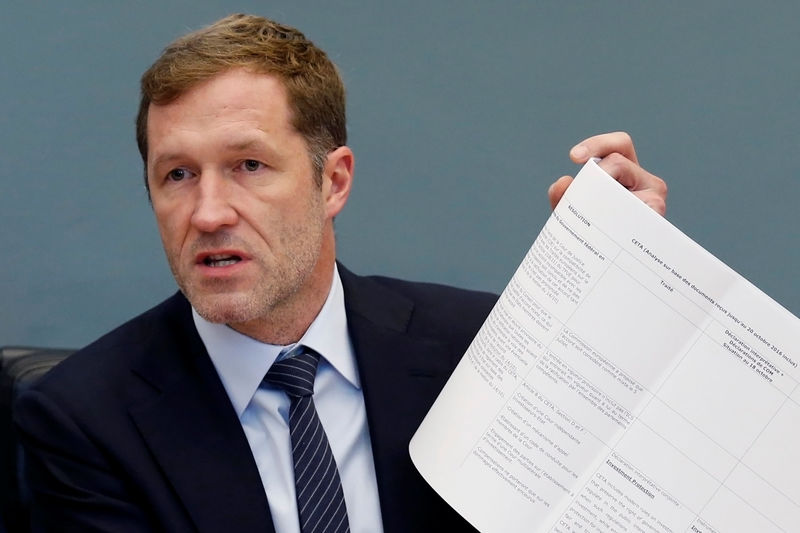By Alastair Macdonald and Philip Blenkinsop
BRUSSELS (Reuters) - The European Union has given Belgium until late on Monday to overcome opposition to a free trade deal with Canada from its French-speaking region or a summit to sign the pact that could boost both economies is off, EU sources said on Sunday.
EU trade negotiators are rushing to assuage the Walloon government's concerns before the Monday deadline set by Canadian Prime Minister Justin Trudeau to decide whether to fly to Brussels, according sources familiar with the matter.
"The Commission has been working 24/7 to find a solution," EU Trade Commissioner Cecilia Malmström tweeted on Sunday. "We now hope that Belgium will bring this matter to a successful close."
Canada, the EU's 12th-largest trading partner, says it is ready to sign the pact as planned on Thursday and years-long negotiations were over, with trade minister Chrystia Freeland saying "the ball is in the EU court."
All 28 EU governments back the Comprehensive Economic and Trade Agreement (CETA), which supporters say could increase trade by 20 percent, but Belgium cannot give assent without backing from its five sub-federal administrations.
French-speaking Wallonia has steadfastly opposed it, saying the deal is bad for Europe's farmers and gives too much power to global corporate interests.
Walloon premier Paul Magnette has said the summit should be delayed to allow more time to deliberate. "An ultimatum is not compatible with the exercise of democracy," he was cited by Belgian public broadcaster RTBF as saying on Sunday.
Belgian Prime Minister Charles Michel will meet with the country's regions on Monday afternoon, RTBF reported.
In a last ditch bid to secure Walloon backing, EU trade officials are offering to tweak a political declaration appended to the treaty, an EU source said.
A source with the European Commission, which is apparently keen to avoid issuing a deadline that could irk Walloon leaders, said the EU executive "understands that Belgium needs a bit of time".
DOMESTIC POLITICS
Many EU leaders suspect the local government in Namur is using its devolved powers to play domestic politics. "This is first of all an inner-Belgian matter," an EU source said.
Walloon Socialist leader Elio Di Rupo, one of the most vocal opponents of the deal, cast doubt a deal could be reached next week.
"They took years to negotiate #CETA and we are refused a few weeks," Di Rupo, a former Belgian prime minister, tweeted on Sunday. "Will we reach a solution? All depends on the contents. If it doesn't change enough, we will maintain our opposition."
European Council President Donald Tusk, who chairs the collective body of the EU's leaders, will speak to Michel by late on Monday, EU sources said, before informing Trudeau's government of the state of play.
"If Michel says he is not in a position to confirm that Belgium will be able to sign on Thursday, then we won't have the summit," a source said.
If postponed, no new summit date will be set, although the source said neither the EU nor Canada is willing to give up on a free trade pact that has been years in the making.
Deadlock over what would be the EU's first with a Group of Seven country, overshadows prospects of completing similar deals with the United States or Japan and undermines a bloc already battered by Britain's vote to leave.
German Vice Chancellor Sigmar Gabriel blamed the deadlock on a failure by the EU executive and Belgian federal government to allay the fears of some regions.
"Canada, Germany, and France had sought more contact with the Walloon government than those supposedly responsible in Brussels," he told Handelsblatt newspaper. "The reasons for the Walloon protest lie in Brussels and not in Berlin."
Supporters say the trade deal could boost the EU economy by 12 billion euros ($13 billion) a year and Canada's by C$12 billion ($9 billion).
